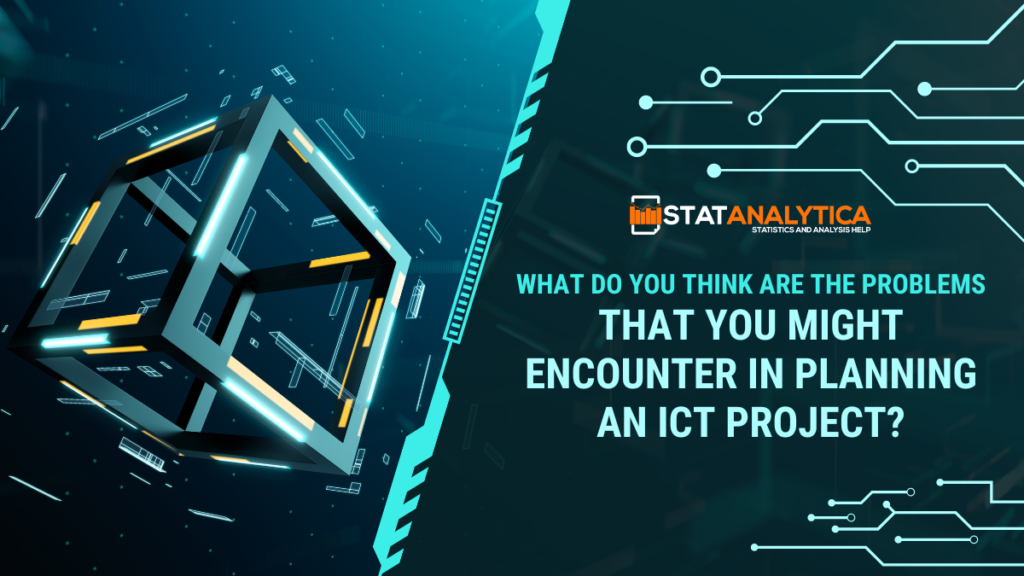In the rapidly evolving landscape of Information and Communication Technology (ICT), planning plays a pivotal role in the success of projects. An ICT project involves intricate details, complex technologies, and diverse stakeholders, making the planning phase crucial for seamless execution. In this blog, we will delve into the potential problems that one might encounter during the planning of an ICT project and explore strategies to overcome these challenges.
What is the Project Scope and Objectives of ICT?
Table of Contents

Lack of Clear Objectives
One of the primary pitfalls in ICT project planning is the absence of clear objectives. Without a well-defined goal, the project team may lose direction, leading to wasted resources and effort.
It is essential to engage stakeholders early on to establish clear and measurable objectives. A collaborative approach in defining project goals ensures alignment with organizational strategies and sets the foundation for a successful project.
Scope Creep
Scope creep, the gradual expansion of project goals beyond the initial plan, is a common challenge in ICT projects. It can result from inadequate initial analysis or changing stakeholder expectations.
Establishing a robust change control process and conducting regular scope reviews can help prevent scope creep.
Additionally, fostering effective communication channels among stakeholders facilitates early detection and resolution of potential scope issues.
Unclear Stakeholder Expectations
Unclear stakeholder expectations can lead to misunderstandings and conflicts during project execution. Regular communication and engagement with stakeholders are critical for understanding their needs and expectations.
Conducting thorough stakeholder analysis and maintaining open lines of communication ensure that everyone is on the same page, reducing the risk of misalignment.
Resource Planning Required For ICT Projects
- Inadequate Budget Allocation
Financial constraints can significantly impact the success of an ICT project. Inadequate budget allocation may result in compromises on essential components, leading to suboptimal outcomes.
To address this, meticulous budget planning, accurate cost estimation, and regular financial reviews are essential. Organizations should consider allocating contingency funds to account for unforeseen expenses, fostering financial resilience.
- Limited Human Resources
The shortage of skilled personnel is a recurring challenge in the ICT industry. Recruiting and retaining qualified team members can be a bottleneck in project planning.
Employing a talent management strategy, investing in training programs, and exploring outsourcing options can help mitigate this challenge.
Collaboration with external experts and strategic partnerships can also provide access to specialized skills when needed.
- Insufficient Technology Infrastructure
A robust technology infrastructure is the backbone of any ICT project. Inadequate hardware, software, or network capabilities can hinder project progress.
Thorough technology assessments, regular updates, and strategic investments in infrastructure upgrades are crucial.
Collaborating with IT experts and leveraging emerging technologies can enhance the project’s technological foundation and future-proof its capabilities.
What Do You Think Are The Problems That You Might Encounter In Planning An ICT Project?
- Lack of clear project objectives
- Scope creep and undefined project boundaries
- Unclear stakeholder expectations
- Inadequate budget allocation
- Limited availability of skilled human resources
- Insufficient technology infrastructure
- Failure to identify and address project risks
- Ineffective risk mitigation strategies
- Absence of contingency planning
- Poor communication with stakeholders
- Ineffective internal team communication
- Misalignment between IT and business units
- Unrealistic project timelines
- Dependency and bottleneck challenges
- Inadequate project monitoring and control
- Integration issues with software and hardware
- Compatibility challenges between components
- Keeping pace with the evolving technology landscape
- Resistance to change among project stakeholders
- Insufficient training programs for end-users
- Lack of user adoption strategies
- Inadequate testing procedures
- Presence of software bugs and defects
- Poor data quality and integrity issues
- Failure to comply with data protection laws
- Concerns related to intellectual property
- Contractual and legal disputes
- Lack of post-implementation evaluation
- Inadequate feedback mechanisms
- Failure to learn from previous projects
Risk Management in ICT Projects
Failure to Identify Risks
Effective risk management is paramount for project success, yet many ICT projects falter due to a failure to identify potential risks.
Conducting comprehensive risk assessments early in the planning phase helps teams proactively identify and address potential challenges.
Regular risk reviews throughout the project life cycle ensure that new risks are identified and managed in a timely manner.
Ineffective Risk Mitigation Strategies
Identifying risks is only the first step; effective mitigation strategies are equally important. Developing a risk response plan that includes preventive, corrective, and contingency measures is essential.
Regularly revisiting and updating the risk management plan ensures its relevance as the project evolves.
A proactive approach to risk management enhances the project team’s ability to navigate uncertainties and challenges successfully.
Lack of Contingency Planning
Unforeseen events can disrupt even the most meticulously planned projects. Without a robust contingency plan, the project team may struggle to respond effectively to unexpected challenges.
Building contingency plans that account for various scenarios and having predefined escalation paths for critical issues enhances the project’s resilience. Regular contingency plan reviews and drills help ensure the team’s readiness to handle unforeseen circumstances.
How Do You Resolve Problems You Might Encounter When Planning an ICT Project?
Resolving problems encountered in planning an ICT project involves a combination of proactive measures, effective communication, and strategic decision-making. Here’s a guide on how to address common issues:
- Clear Project Objectives:
- Engage stakeholders in defining and clarifying project objectives.
- Conduct regular reviews to ensure alignment with organizational goals.
- Establish a change control process to manage evolving objectives.
- Scope Creep:
- Implement a robust change control system with clear approval processes.
- Regularly review and update the project scope in collaboration with stakeholders.
- Communicate changes and their implications to the entire project team.
- Unclear Stakeholder Expectations:
- Conduct thorough stakeholder analysis and maintain open communication channels.
- Establish a feedback loop to address and clarify expectations promptly.
- Provide regular project updates to keep stakeholders informed and engaged.
- Inadequate Budget Allocation:
- Conduct accurate cost estimations and regularly review the project budget.
- Prioritize spending based on critical project components.
- Consider allocating contingency funds for unforeseen expenses.
- Limited Human Resources:
- Implement a comprehensive talent management strategy.
- Invest in training programs to upskill existing team members.
- Explore strategic partnerships and outsourcing options.
- Insufficient Technology Infrastructure:
- Conduct thorough technology assessments before project initiation.
- Regularly update and upgrade technology infrastructure based on project needs.
- Collaborate with IT experts to ensure the scalability and compatibility of infrastructure.
- Risk Management:
- Identify and assess risks early in the project planning phase.
- Develop a comprehensive risk response plan with preventive and contingency measures.
- Regularly revisit and update the risk management plan throughout the project lifecycle.
- Communication Challenges:
- Establish clear communication channels and protocols.
- Conduct regular stakeholder and team meetings to address concerns.
- Utilize collaboration tools to enhance communication and transparency.
- Timeline and Scheduling Issues:
- Set realistic project timelines based on thorough analysis.
- Identify and address dependencies and potential bottlenecks early.
- Regularly monitor progress and adjust the schedule as needed.
- Technology Challenges:
- Conduct thorough testing, especially for integration and compatibility.
- Collaborate with technology vendors and leverage standardized interfaces.
- Stay updated on emerging technologies to adapt to the evolving landscape.
- Change Management:
- Implement change management strategies to address resistance.
- Clearly communicate the benefits of changes to all stakeholders.
- Involve employees in the decision-making process to foster ownership.
- Quality Assurance:
- Implement comprehensive testing procedures for all project components.
- Conduct regular code reviews and address bugs promptly.
- Establish data quality checks and cleansing processes.
- Legal and Regulatory Compliance:
- Thoroughly understand and incorporate data protection and legal requirements.
- Engage legal experts for compliance assessments and contract negotiations.
- Regularly update project processes based on changes in regulations.
- Evaluation and Feedback:
- Build structured evaluation processes into the project plan.
- Implement regular feedback sessions and adjust project strategies accordingly.
By proactively addressing these aspects throughout the project lifecycle, teams can enhance their ability to overcome challenges and ensure the successful planning and execution of ICT projects.
Conclusion
In conclusion, planning an ICT project is a multifaceted undertaking that requires careful consideration of various factors. The challenges outlined in this blog underscore the complexity of ICT projects and the importance of proactive planning.
By addressing these challenges through strategic planning, effective communication, and continuous improvement, organizations can enhance the likelihood of successful ICT project execution. Embracing a collaborative and adaptive approach to project management fosters resilience in the face of evolving technologies and dynamic organizational landscapes.
Ultimately, navigating the challenges of planning an ICT project requires a holistic and forward-thinking perspective, ensuring that the project aligns with organizational goals and delivers lasting value.


